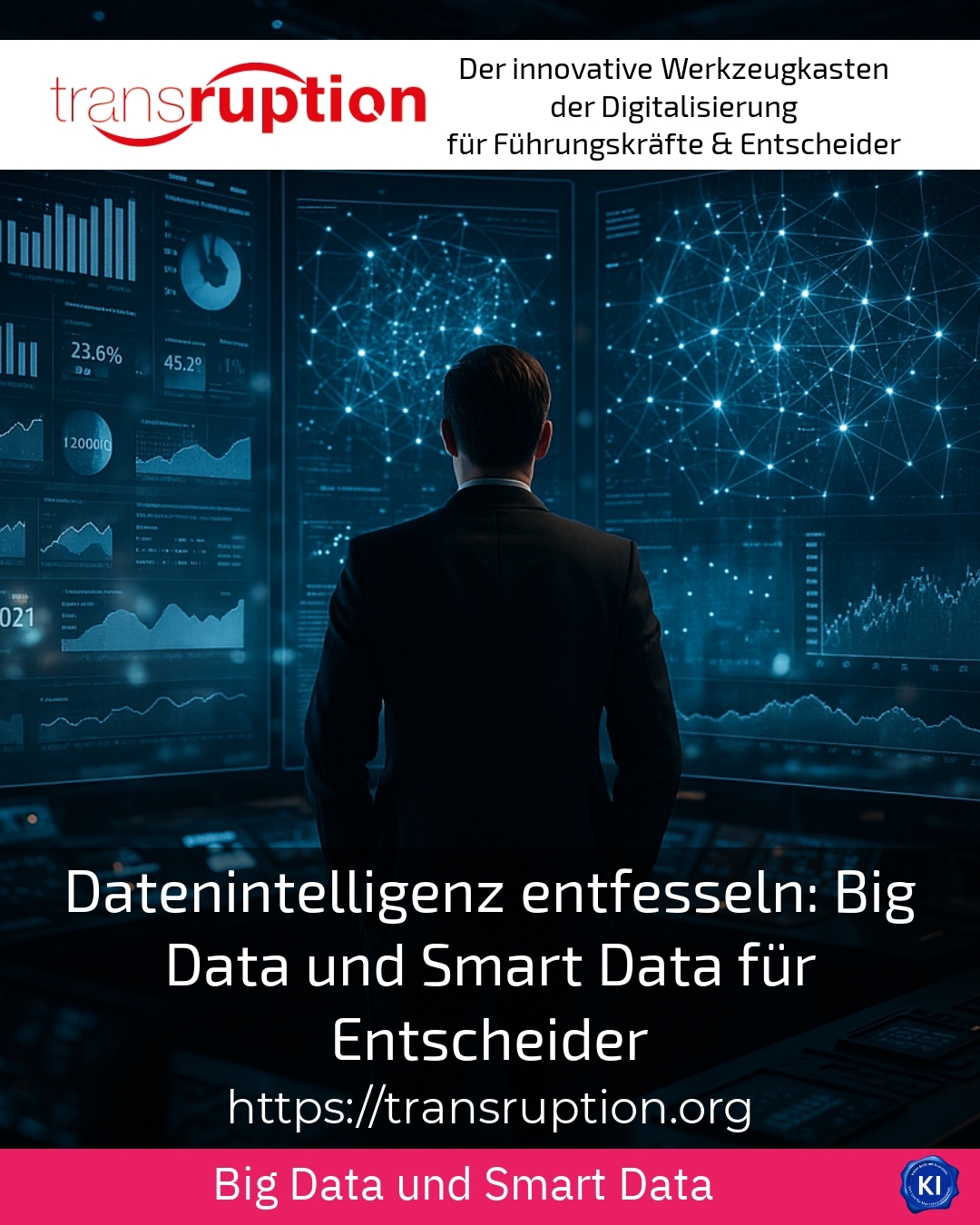In today's digital age, companies are increasingly gaining a decisive factor: the ability to generate valuable insights from large and complex data pools. The importance of Data intelligence is growing steadily because it supports decision-makers in not only collecting data volumes, but also analysing them in a targeted manner and making them usable. The combination of big data and smart data plays a key role in creating full transparency and efficiency in business processes.
Data intelligence: bridging the gap between big data and smart data
Big data stands for the enormous amounts of data that are generated in companies every day. This data comes from all kinds of sources: Transaction data in banks, sensor data in production or communication data in retail. The sheer volume alone presents decision-makers with major challenges, as not all information is relevant or helpful. This is where Data intelligence It ensures that big data becomes smart data, i.e. that targeted, high-quality and usable information is extracted from large, disorganised volumes of data.
An example from industry: a machine manufacturer uses extensive sensor data to filter out only the crucial values for condition monitoring with the help of algorithms. This enables an early response to wear and tear or malfunctions, which minimises downtime and reduces costs. In retail, companies analyse their customers' purchase and movement data and use it to develop personalised offers that improve customer satisfaction and increase sales.
In the financial sector, on the other hand, banks benefit from data-intelligent processes to detect fraud attempts more quickly and optimise their risk management. These multi-layered applications show how data-intelligent systems can make decision-making processes more secure and efficient.
From a sea of data to targeted information - how data intelligence works
Decision-makers are often faced with the challenge of extracting the necessary impulses from the sea of data. Data intelligence helps to structure this mass of data and filter out the relevant information. Modern technologies such as artificial intelligence (AI), machine learning and data mining, which are used to automatically comb through and analyse data volumes, provide support here.
In the example of e-commerce, these techniques can be used to generate personalised product recommendations based on individual customer profiles. This not only increases the conversion rate, but also customer loyalty. In logistics, on the other hand, data-intelligent analysis enables the optimisation of supply chains - movement data, stocks and transport times are coordinated in such a way that costs are reduced and delivery times shortened.
Another example from the healthcare sector: Doctors and clinics are using data intelligence to better understand patient progression and target therapies more precisely. The combination of patient data, research findings and real-time data from wearables creates individualised treatment concepts.
BEST PRACTICE at the customer (name hidden due to NDA contract) A medium-sized pharmaceutical company used data-intelligent systems to derive precise drug potentials from research data and market information. This accelerated product development and significantly reduced risks in investment decisions.
Added value through intelligent data analysis
The concern of the Data intelligence is to generate real added value from the available data. The sheer quantity of data, as described by big data, only provides limited insights without quality and context. It is therefore crucial to put data into context, filter it and make it usable for specific questions.
For example, insurance companies use data-intelligent processes to recognise and assess claims more quickly. This shortens decision-making times and improves service for customers. A telecommunications provider can better control network quality and make targeted investments by precisely analysing usage and fault reports.
Data-intelligent tools are also used in HR management. Here, they help to effectively analyse applicant data and precisely match talent profiles with company requirements.
BEST PRACTICE at the customer (name hidden due to NDA contract) A large logistics group used smart data to identify weak points by analysing supply chains in real time. Data-intelligent control led to a significant reduction in delays and an improved customer experience.
Data intelligence as the key to sustainable decisions
Companies that strengthen their data intelligence gain decisive advantages. Because in a world characterised by digitalisation and networking, smart data opens up solutions for efficiency, adaptability and innovative strength. It enables an agile response to market changes and promotes the proactive design of business models.
In a highly competitive environment, data-intelligent decision-making processes play a central role. They help managers to better assess risks, recognise opportunities at an early stage and act in a way that conserves resources.
BEST PRACTICE at the customer (name hidden due to NDA contract) A leading retail company used data intelligence to identify seasonal sales patterns. The data-based forecast led to optimised order quantities and minimised excess stock in the long term.
My analysis
The combination of big data and smart data forms the basis for a distinctive Data intelligence, that decision-makers urgently need today. The intelligent selection, processing and interpretation of data enables well-founded decisions to be made, efficiency to be increased and innovation to be driven forward. Companies from various industries report on how data-intelligent solutions support projects and provide important impetus. Consistent further development of data expertise is increasingly becoming a key factor for sustainable success and competitiveness.
Further links from the text above:
Data intelligence: big data and smart data for decision-makers
Big data vs. smart data: is more always better?
Smart data: How intelligent data is shaping our future
Big data: the utilisation of large amounts of data
Data intelligence: How decision-makers use big & smart data
For more information and if you have any questions, please contact Contact us or read more blog posts on the topic TRANSRUPTION here.















